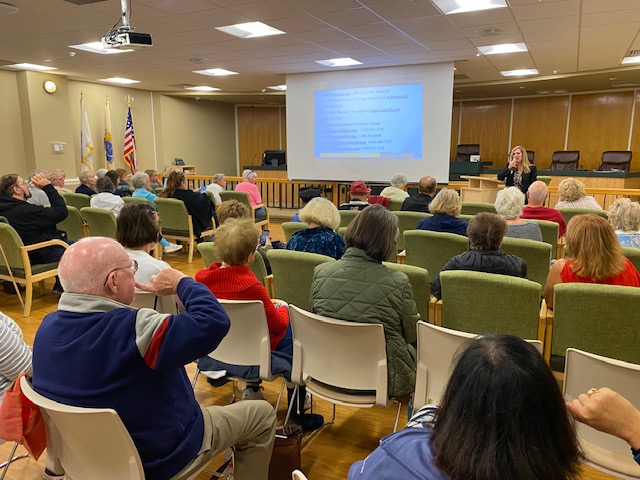 FBI Senior Agent Jessica Weisman speaks to seniors at a Longport Library lunch and learn about hot to protect themselves against elder fraud.
FBI Senior Agent Jessica Weisman speaks to seniors at a Longport Library lunch and learn about hot to protect themselves against elder fraud.
By NANETTE LoBIONDO GALLOWAY
LONGPORT More than 60 senior citizens Wednesday enjoyed a light lunch at Borough Hall and learned about how to protect themselves against elder fraud. The Longport Public Library arranged the lunch and learn to provide seniors with information about how they can avoid becoming victims of crime.
According to Longport Ptl. Officer Frank Lupperger, the session was a result of teamwork. Library director Ricky Gerhardt asked Chief Frank Culmone for resources on the topic, and Culmone contacted the local FBI office in Linwood to speak at the meeting, which was held in Commission Chambers.
Nearly every seat was taken as residents listened intently to the ways criminals, mostly from overseas, perpetrate fraud on the elderly. Some raised their hand to ask questions and others shared their own experiences.
We're fighting a worldwide problem, Senior Supervisory Agent Jessica Weisman said.
There were more than 2.6 million reported cases of identity theft in seniors over age 65, she said.
These numbers are low, Weisman said. They only include the crimes that were reported to the FBI, and they don't include crimes reported to local or state police.
Most of the perpetrators are located in foreign countries, such as Russia, China, Nigeria and Ghana. The COVID-19 pandemic provided the perfect opportunity for fraud crimes to increase.
We cannot prosecute our way out of this, it's more like educating our way out, Special Agent Dan DiPietro said before sharing ways criminals defraud the elderly out of money, such as unauthorized transfers of funds through email, technical support pop-ups that say your computer is compromised, clicking on malware or ransomware, and phishing.
He recommended that people not respond to Facebook memes that ask you the name of your first grade teacher, avoid online dating apps that can lead to romance fraud schemes, especially if the sweetheart you never met in person requests advance funds for a project they are involved in.
In most cases, it takes painstaking investigation to find the perpetrators, who are spamming millions of people just to find a few victims that can make them rich.
We turn over rocks to find them, and each day, what we find are more rocks, Weisman said.
They warned seniors to be vigilant in protecting themselves from fraud. Most of the time it's a simple solution: hang up the phone.
Mail fraud includes fake charities requesting donations, telling you that you won the lottery or they are from the government.
The IRS will never, ever call you on the phone. They do everything in writing. Just hang up, she said.
One of the most common fraud schemes is the grandparent scheme, where the caller poses as a grandchild saying they are in trouble and need money sent to them in a far away place. The most prevalent scam is non-delivery of something purchased on social media, or the product is not what was described when you bought it.
Then there are the high pressure telemarketers who use scare tactics, she said. Be aware of any type of unsolicited investment scheme, reverse mortgage, or today, crypto is big. Unlike other types of investments, crypto is not regulated by the government. You can lose all your money, so be careful.
Why do criminals specifically target older adults?
Because that's where the money is, she said. They figure you're retired, sitting on a nest egg, have memory problems, and since you're not going to work, you're always home so they can reach you.
The agents offered advice on how to protect seniors from elder fraud: hang up the phone, shred your personal information, regularly review your credit reports, check your bank statements when they come in the mail, shred old credit cards. Other protective actions include always using strong passwords, change your passwords every six months, never use public wi-fi while conducting financial transactions, and regularly monitor your credit accounts.
You are your own first line of defense, Weisman said.
Anytime a senior thinks they may be a victim of fraud, contact the local police, she said.
Don't be embarrassed, it can happen to anyone, including me, she said relaying several instances of potential fraud that she experienced.
In one account, Weisman said she was unaware she was being victimized until she gave the person on the line her FBI email address. They quickly ended the call.
Nancy Kahane of Ventnor said she has never been targeted directly but she did receive a call from her bank regarding charges on her account that the bank felt were suspicious.
It's good to hear the information on how to protect yourself over and over again and come to sessions like this. It always gives me a new perspective, she said.
Pat Harrigan, also of Ventnor, found out about the program by being a regular visitor to the Longport Public Library.
I thought it was very well presented and I feel more informed, she said. I'm going to have to go home and make some changes.
If you suspect elder abuse, file a complaint online at www.ic3.gov or call 833-3728311. Learn more at fbi.gov/elderfraud.
Copyright Mediawize, LLC 2022